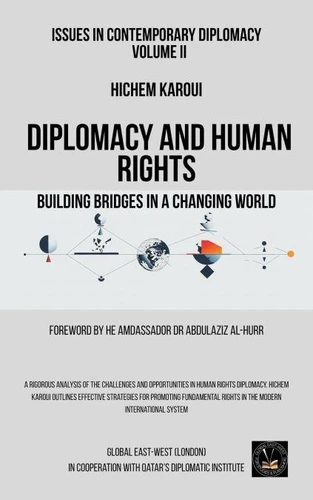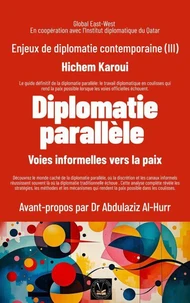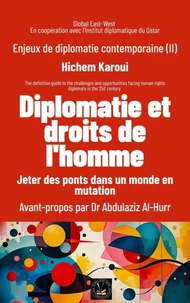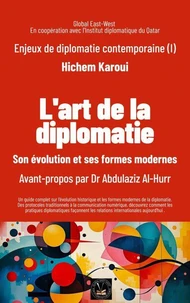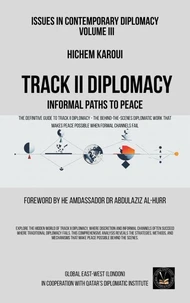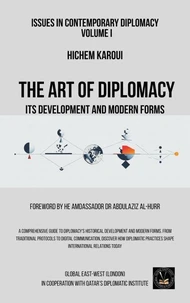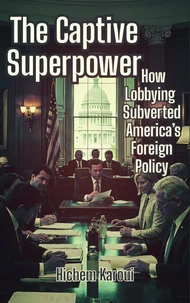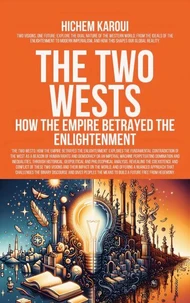Nouveauté
Issues in Contemporary Diplomacy (II): Diplomacy and Human Rights. Diplomacy
Par :Formats :
Disponible dans votre compte client Decitre ou Furet du Nord dès validation de votre commande. Le format ePub protégé est :
- Compatible avec une lecture sur My Vivlio (smartphone, tablette, ordinateur)
- Compatible avec une lecture sur liseuses Vivlio
- Pour les liseuses autres que Vivlio, vous devez utiliser le logiciel Adobe Digital Edition. Non compatible avec la lecture sur les liseuses Kindle, Remarkable et Sony
- Non compatible avec un achat hors France métropolitaine
 , qui est-ce ?
, qui est-ce ?Notre partenaire de plateforme de lecture numérique où vous retrouverez l'ensemble de vos ebooks gratuitement
Pour en savoir plus sur nos ebooks, consultez notre aide en ligne ici
- FormatePub
- ISBN8232472535
- EAN9798232472535
- Date de parution03/11/2025
- Protection num.Adobe DRM
- Infos supplémentairesepub
- ÉditeurHamza elmir
Résumé
"Issues in Contemporary Diplomacy (II): Diplomacy and Human Rights - Building Bridges in a Changing World" by Hichem Karoui delivers an insightful analysis of how diplomatic mechanisms can effectively promote and protect human rights in today's complex international environment. This scholarly work addresses the fundamental question of "how the practice of diplomacy can promote human rights in this complex context". Karoui's systematic approach examines the evolution of both diplomatic practice and human rights frameworks, demonstrating how these fields have become increasingly interconnected.
The book explores how "the nature of relations between states and international communities has changed with shifts in international politics and global powers", requiring new approaches to rights-based diplomacy. Through twelve comprehensive chapters, readers gain insights into historical developments, contemporary challenges, and future opportunities for advancing human rights through diplomatic channels.
The work addresses critical contemporary issues, including the balance between national sovereignty and universal human rights, the economic dimensions of rights protection, and the transformative impact of technology on both diplomatic practice and human rights advocacy. Karoui demonstrates how "commitment to human rights forms the basis for building international relations based on mutual respect and justice".
Particularly relevant for digital-native readers, the book examines how "continued advances in communication technology and the widespread dissemination of information" have made "international policies on human rights more influential and important in building a more equitable and peaceful world". The author provides practical frameworks for understanding how diplomatic strategies must evolve to address contemporary human rights challenges whilst maintaining effectiveness in traditional interstate relations.
This essential volume combines theoretical rigour with practical applicability, making it invaluable for practitioners, scholars, and anyone seeking to understand the crucial intersection of diplomacy and human rights in our globalised world.
The book explores how "the nature of relations between states and international communities has changed with shifts in international politics and global powers", requiring new approaches to rights-based diplomacy. Through twelve comprehensive chapters, readers gain insights into historical developments, contemporary challenges, and future opportunities for advancing human rights through diplomatic channels.
The work addresses critical contemporary issues, including the balance between national sovereignty and universal human rights, the economic dimensions of rights protection, and the transformative impact of technology on both diplomatic practice and human rights advocacy. Karoui demonstrates how "commitment to human rights forms the basis for building international relations based on mutual respect and justice".
Particularly relevant for digital-native readers, the book examines how "continued advances in communication technology and the widespread dissemination of information" have made "international policies on human rights more influential and important in building a more equitable and peaceful world". The author provides practical frameworks for understanding how diplomatic strategies must evolve to address contemporary human rights challenges whilst maintaining effectiveness in traditional interstate relations.
This essential volume combines theoretical rigour with practical applicability, making it invaluable for practitioners, scholars, and anyone seeking to understand the crucial intersection of diplomacy and human rights in our globalised world.
"Issues in Contemporary Diplomacy (II): Diplomacy and Human Rights - Building Bridges in a Changing World" by Hichem Karoui delivers an insightful analysis of how diplomatic mechanisms can effectively promote and protect human rights in today's complex international environment. This scholarly work addresses the fundamental question of "how the practice of diplomacy can promote human rights in this complex context". Karoui's systematic approach examines the evolution of both diplomatic practice and human rights frameworks, demonstrating how these fields have become increasingly interconnected.
The book explores how "the nature of relations between states and international communities has changed with shifts in international politics and global powers", requiring new approaches to rights-based diplomacy. Through twelve comprehensive chapters, readers gain insights into historical developments, contemporary challenges, and future opportunities for advancing human rights through diplomatic channels.
The work addresses critical contemporary issues, including the balance between national sovereignty and universal human rights, the economic dimensions of rights protection, and the transformative impact of technology on both diplomatic practice and human rights advocacy. Karoui demonstrates how "commitment to human rights forms the basis for building international relations based on mutual respect and justice".
Particularly relevant for digital-native readers, the book examines how "continued advances in communication technology and the widespread dissemination of information" have made "international policies on human rights more influential and important in building a more equitable and peaceful world". The author provides practical frameworks for understanding how diplomatic strategies must evolve to address contemporary human rights challenges whilst maintaining effectiveness in traditional interstate relations.
This essential volume combines theoretical rigour with practical applicability, making it invaluable for practitioners, scholars, and anyone seeking to understand the crucial intersection of diplomacy and human rights in our globalised world.
The book explores how "the nature of relations between states and international communities has changed with shifts in international politics and global powers", requiring new approaches to rights-based diplomacy. Through twelve comprehensive chapters, readers gain insights into historical developments, contemporary challenges, and future opportunities for advancing human rights through diplomatic channels.
The work addresses critical contemporary issues, including the balance between national sovereignty and universal human rights, the economic dimensions of rights protection, and the transformative impact of technology on both diplomatic practice and human rights advocacy. Karoui demonstrates how "commitment to human rights forms the basis for building international relations based on mutual respect and justice".
Particularly relevant for digital-native readers, the book examines how "continued advances in communication technology and the widespread dissemination of information" have made "international policies on human rights more influential and important in building a more equitable and peaceful world". The author provides practical frameworks for understanding how diplomatic strategies must evolve to address contemporary human rights challenges whilst maintaining effectiveness in traditional interstate relations.
This essential volume combines theoretical rigour with practical applicability, making it invaluable for practitioners, scholars, and anyone seeking to understand the crucial intersection of diplomacy and human rights in our globalised world.

